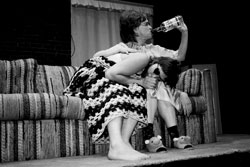Liberals—and in particular Seattle liberals—have a perverse fascination, part desire and part repulsion, with the low-rent, high-drama demographic known as white trash. Rednecks, our cultural car crash, make us swoon; we can’t look away. Whether some sort of overweening classism or a kind of Freudian slumming, our apparently unending awe of hillbilly culture and its attendant grotesqueries can be seen in everything from the popularity of Sling Blade and Jerry Springer to the sight of suburban hipsters slouching down Broadway with their chained-down wallets, overgrown muttonchops, and mock-grimy trucker hats.
There’s something liberating in the very slovenliness of the yahoo, an almost Whitmanesque fuck-you pride, and yet it’s that freedom from taboo that most frightens us: Civilized folk stop short of screwing their cousins, right? Yup, gimme some ah those thar fried taters, boy-o—they’ze taaaystee.
Tapping into this odd fear and longing for all things trailer park, Kelleen Conway Blanchard’s Small Town, directed by local theater veteran Bret Fetzer, plays out like an over-the-top comic inversion of Deliverance, full of fun-loving sickness and psychotic behavior. It’s all here: incest jokes and busted dreams, bestiality and deformity, the filth and the fury. And yet, despite some truly hilarious moments and fine execution by a uniformly strong cast, the play leaves a bad taste—not because of any inherent tastelessness, which, after all, is the point. What’s wrong with Small Town is the same thing that’s wrong with every wry cousin-fucking joke and mullet quip and every other smug dig or outward appropriation of the hillbilly way of life: a holier-than-thou condescension that seeks to distance itself from rather than understand its subject, that searches for yuks in caricature and meanness rather than character and fondness. When it comes to bad faith, this may not equal the moral offense of blackface, but it’s of the same coin. The reason we don’t call foul is that the targets of humor are white.
Behold, then, the Ledbetters: Ruby (Teri Lazzara), the gravel-voiced mama hen who smokes cigarettes through her tracheotomy hole; her one-eyed daughter, Lucinda (Betsy Morris), a buxom, bighearted flirt; and her brother, Stu Lionel (Aaron LaPlante), a huge man-child given to creepy gnomic utterances that indicate a potentially homicidal detachment from reality (watching the flailing of a headless rooster, for instance, gives Stu Lionel “that rainbow happy feeling). Also in the mix is Bud (Daniel Christensen), Lucinda’s six-testicled sometime boyfriend (they’re “really small balls,” she explains). When plastic-skulled Sheriff Dwayne (Chris Dietz) calls on the Ledbetters while investigating the disappearance of some 17 mailmen, the family springs into action: protection and enabling is the way of all unregenerate flesh, especially when serial murder is involved. Lucinda, of course, pitches half-assed woo to the sheriff, who’s loved her since she was just a wee slattern, and mom just grabs the shotgun. And so it goes. Eventually the sheriff finds his way into Stu’s basement lair, necessitating the trial that opens the second act. “This world is full of sad,” Lucinda says from the stand. Indeed.
Technically speaking, the play is snappy and quick-paced; Fetzer, who has an obvious knack for comedy, keeps things flowing nicely, and he seems to work well with actors, drawing from each a solid performance. The staging is exceptional, especially considering the tight space of CHAC’s downstairs venue; for instance, by virtue of a ratty couch that flips back on hinges, Stu Lionel’s underground abattoir is revealed. It’s a nice touch, as is the split-second conversion of that same couch into a mammoth dining table. Also noteworthy are the wonderful musical interludes that punctuate the action: Bud’s uproariously heartfelt crooning of the Scorpions’ “No One Like You,” or the final number, an astonishing bluegrass version of Outkast’s hit “Hey Now,” with the whole cast chanting the chorus in a flat-footed monotone.
These moments stand out not only for their expert execution but also for their refreshing sense of levity—of good-hearted fun and comic warmth, for lack of better terms. It is not impossible to have a laugh at the world’s unfortunates and grotesques without creating an intellectual buffer protecting us from the stain of identification; Sherwood Anderson’s Winesburg, Ohio, with its deep feeling for the tragicomic circumstances of the displaced and dispossessed, comes to mind, as does the work of Nelson Algren or Kurt Vonnegut or even director John Waters. In the end, the problem with Small Town has nothing to do with the play’s trafficking in ritual dismemberment, dead baby jokes, incest, incontinence, and the otherwise pathetic lifestyles of the sick and impoverished. Everything, after all, has its place. The problem is, oddly enough, its lack of humor—humor in the more Platonic sense of being able to recognize and embrace the universality of human folly. Notwithstanding the talent and dedication of those involved, Small Town has a small heart, and that’s too bad.








